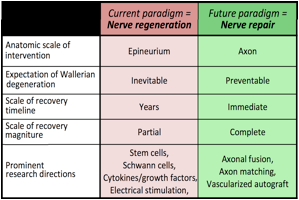Axonal Repair as a New Paradigm for Nerve Coaptation
Peter W Henderson, MD MBA
Memorial Sloan Kettering Cancer Center, New York, NY
Introduction:The ideal outcome of nerve coaptation is complete and immediate recovery, but surgeons are largely resigned to the expectation that motor and sensory functional recovery will be no more than incomplete and protracted.This project aimed to synthesize a current paradigm for nerve coaptation, and to determine whether the latest technology and basic science research warrant a new, future paradigm that can finally realistically aim for nerve recovery that is complete and immediate.
Materials and
Methods:For this study, "regeneration" is defined as the process of axonal sprouts advancing towards the target organ (necessary because Wallerian degeneration rapidly destroys the nerve distal to the point of injury), while "repair" is the re-establishment of axonal membranous continuity (prior to the onset of Wallerian degeneration).The current paradigm and the proposed future paradigm were synthesized from primary resources from multiple databases (Pubmed, Google Scholar, and the US Patent and Trademark Office), as well as from personal communication with key thought-leaders.
Results:The current paradigm for nerve coaptation focuses on optimizing the innate regenerative process.In the research setting, this is done by manipulation of the local microenvironment.In clinical practice, this is done by placement of epineurial sutures.This regenerative approach, however, fails to address axonal discontinuity, and therefore has a low likelihood of effective recovery.The future paradigm, in contrast, can instead focus on actual axonal membranous repair.Early pre-clinical research has achieved axonal membranous fusion, and in doing so has immediately reestablished electrical conduction, and thereby prevented Wallerian degeneration.
Conclusions: This study has found that recent advancements are making it possible to finally address axonal discontinuity, and therefore a new, future paradigm for nerve coaptation that focuses on "repair" as opposed to only "regeneration" is in fact warranted.By restating and clarifying the ultimate goal of nerve coaptation, this new paradigm will hopefully serve as a framework for clinical and research efforts in nerve recovery in the 21st century.
Back to 2017 ePoster Listing
